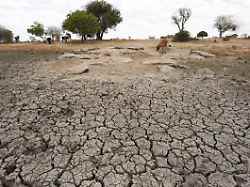Total and donor countries still open
Climate conference agrees on fund against climate damage
11/20/2022, 3:55 am
So the extension was worth it: after tough wrestling and an additional 36 hours, the representatives of 200 countries agree on a fund to deal with climate damage. Developing countries should benefit. However, it is unclear who pays and how much.
The world climate conference in Egypt agreed for the first time on a common pot of money to compensate for climate damage in poorer countries. The representatives of around 200 states decided on the new fund early on Sunday morning. However, the necessary approval of the final declaration was still pending.
The aim is to cushion the inevitable consequences of global warming, such as increasingly frequent droughts, floods and storms, but also rising sea levels and desertification. The question was the biggest point of contention throughout the two-week conference in Sharm el Sheikh, which was extended by around 36 hours. The resolution does not mention any sums for the new compensation fund, nor who exactly should pay in. Developing countries that are particularly at risk are to be favoured.
The EU in particular had insisted on this limitation. The US initially blocked the issue, while the group of more than 130 developing countries known as the G77 built pressure along with China. After initial reluctance, the European Union finally changed its mind.
Postponed to next climate conference
The first plan is to set up a transitional commission to draw up recommendations. This will then be discussed at the next UN climate conference in Dubai at the end of 2023. The Commission is to be made up of 10 representatives from the industrialized countries and 13 from the developing countries.
Ani Dasgupta, President of the US think tank World Resources Institute, spoke of a “historic breakthrough”. The fund will be a lifebelt “for poor families with destroyed homes, farmers with ruined fields and islanders displaced from their ancestral homes.” At the same time, representatives of developing countries left without clear commitments on how the money pot would be overseen.
According to the World Resources Institute, more than 3.3 billion people worldwide live in areas that are particularly vulnerable to climate change.
Climate expert Jan Kowalzig from Oxfam Germany described the agreement as a “milestone” and “real success in the fight against climate change”. For years, such a pot of money was blocked by the rich countries for fear of being held responsible for causing the climate crisis. “The fact that the industrialized countries have finally moved was more than overdue given the destruction that the climate crisis is already causing in many of the poorer countries of the Global South,” he said.
